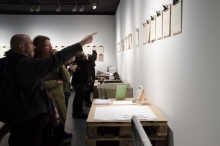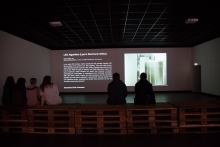Evil Media Distribution Centre
Evil Media Distribution Centre
Perception of ideas leads to new ideas. – Sol LeWitt, Sentences on Conceptual Art (1969)
The amalgamation of theory and practice is a prevalent aspiration in much contemporary art discourse. The ambition is to expand the perspective and relevance of artwork beyond its formal boundaries and to connect the abstractions of the written word to the materiality and experiences of life. This amalgamation is also essential to the transmediale festival. However, with its diverse and intense program of exhibitions, installations, performances, workshops and conference, the festival does not integrate theory and practice as separate entities but as fundamentally connected realms of reflective activity. For the transmediale, theory is not just theory, practice is not just practice. The festival promotes and explores the idea that an artwork expresses theoretical significance and that a theory, like the artwork, unfolds speculative critique and visions about our media society and is a practice of its own sort. Beyond institutional and disciplinary formalities, it approaches theory as an inherent part of practice, and practice as inherent to theory to create a transversal understanding of the energies, knowledge and perspectives of this condition and the possibilities they present for an investigative and inventive engagement in society.
In this context, Evil Media Distribution Centre by YoHa (Matsuko Yokokoji and Graham Harwood) is a genuine transmediale project and one of the most explicit manifestations of the festival’s ambition to present theory and practice as an interconnected whole. The installation is an artistic response to the recently published book Evil Media (2012) by Matthew Fuller and Andrew Goffey, in which the two authors argue for an expanded notion of media or forms of mediation and a deeper, more complex understanding of their effects on how we act, perceive and think in our daily lives. They focus on the pervasive presence of so-called “gray media,” whose mediations “facilitate and amplify the creation of troubling, ambiguous social processes, fragile networks of susceptible activity, opaque zones of knowledge—the evil of media.” The argument takes the form of a series of stratagems that, “rather than simple recipes to be followed, might better be understood as operative constructs in the sense that they have to be taken up, used, worked with …” It is this anticipation of the stratagems’ involvement in experimental practices beyond the pages of the book that YoHa meet. The artists have invited 66 contributors to choose and write a short text about a gray media object, and these texts and objects are then presented in the setting of a curiosity cabinet designed as a distribution center (the presentation media—the pallets, forklift, plastic bags, clipboards and projectors—are also accompanied by a text). With this close proximity between text and object, ideas and materiality, the installation demonstrates a mindset and method where the amalgamation of theory and practice is not a point in itself, but becomes a working condition for developing reflective engagement with the evil of media.


